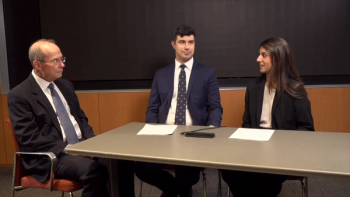
Post hoc analysis of varenicline solution OC-01 shows promise for dry eye patients undergoing anticholinergic therapy
At AAO 2022 in Chicago, Illinios, Christopher Starr, MD, presented a talk entitled, "Efficacy of OC-01 (varenicline solution) (VNS) 0.03mg for Treatment of Dry Eye Disease Signs and Symptoms in Subjects With and Without Antidepressant/ Anxiolytic Use: Post-hoc Analysis of ONSET-1 and ONSET-2 Clinical Trials."
Video transcript
Note: This transcript has been lightly edited for clarity.
Hi there. My name is Christopher Starr. I'm coming to you from the World Cornea Congress in Chicago. I'm an associate professor of ophthalmology at the Weill Cornell Medical Center in New York City. And I just gave a paper presentation here at the WCC on the effect of varenicline nasal solution in the treatment of dry eye disease. And we looked at a post hoc analysis of the clinical trials, 3 clinical trials that were done for the nasal spray.
The nasal spray worked on the parasympathetic nervous system and is a cholinergic receptor agonist. And we wanted to look—do a post hoc analysis of the clinical trial data to kind of see patients who were also taking anticholinergic medications, namely antidepressants and anxiolytic medications, things like Prozac and Xanax, et cetera, et cetera, et cetera. We know that these patients tend to have dry eye disease and in a lot of cases, more difficult disease to treat because of this anticholinergic effect from these systemic medications.
So the post hoc analysis looked at Schirmer test scores and EDS eye dryness score change from baseline. It's a small sample sizes in these post hoc analyses. But in essence, what we found was that the patients who were taking antidepressant and anxiolytic medications did quite well with the varenicline OC-01 nasal spray in the clinical trial.
There was significant improvements in in Schirmer test scores at the four week visit; there was a significant increase in the proportion of patients who achieved a greater than or equal to 10-millimeter increase in Schirmer test scores amongst the anxiolytic antidepressant group and the non-AM group. And then lastly, the EDS scores improved significantly between the two groups at the 4-week visit.
So in summary, we see that the anxiolytic antidepressant, ie anticholinergic medications don't adversely affect outcomes with the OC-01 varenicline nasal spray in this post hoc analysis.
Well, you know, if you have a patient who might be taking some of these systemic medications, and as dry eye specialists, ocular surface specialist, we always look at systemic medications and try to assess the impact that these medications might be having, especially in patients who are not getting better with traditional treatments: drops, immunomodulators, so on and so forth; punctal plugs. And in those patients, sometimes we are faced with the decision of well, should we recommend stopping these medications? And, you know, no patient wants to stop an antidepressant that is helping them, you know, with their depression.
So, this, you know, the nasal spray varenicline might be a reasonable option in those patients. You know, where you're struggling, you're certainly not going to stop the systemic medication. And this, you know, would be a good medication to try in these patients with dry eye disease.
Newsletter
Don’t miss out—get Ophthalmology Times updates on the latest clinical advancements and expert interviews, straight to your inbox.





























